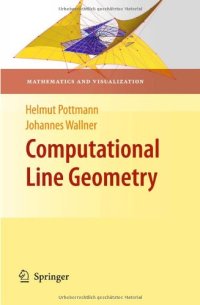
Ebook: Computational Line Geometry
- Tags: Geometry, Computational Mathematics and Numerical Analysis, Visualization, Computer Graphics, Industrial and Production Engineering
- Series: Mathematics and Visualization
- Year: 2010
- Publisher: Springer-Verlag Berlin Heidelberg
- Edition: 1
- Language: English
- djvu
The geometry of lines occurs naturally in such different areas as sculptured surface machining, computation of offsets and medial axes, surface reconstruction for reverse engineering, geometrical optics, kinematics and motion design, and modeling of developable surfaces. This book covers line geometry from various viewpoints and aims towards computation and visualization. Besides applications, it contains a tutorial on projective geometry and an introduction into the theory of smooth and algebraic manifolds of lines. It will be useful to researchers, graduate students, and anyone interested either in the theory or in computational aspects in general, or in applications in particular.
From the reviews :
"The authors have combined results from the classical parts of geometry with computational methods. This results in a unique and fascinating blend, which is shown to be useful for a variety of applications, including robotics, geometrical optics, computer animation, and geometric design. The contents of the book are visualized by a wealth of carefully chosen illustrations, making the book a sheer pleasure to read, or even just browse in. The book will help to bring the concepts and techniques of line geometry, which have been shown to be useful for various applications in geometric design and engineering, to the attention of a wider audience."
B.Jüttler, MATHEMATICAL REVIEWS Clippings 2002f
"...There is a vast amount of fascinating geometry of all sorts in this book. The topics are perhaps somewhat eclectic - they mirror the primary interests of the authors - but, because the motivation is to develop the geometry that applies to real world problems, the subject is far from monolithic and is open to interpretation. The ideas here build up layer upon layer. In the end, the authors have been mostly successful in sustaining their central theme, despite the need to weave together projective, differential, algebraic and metric geometry. They have also presented the mathematics in a predominantly modern way. That is important because there exist in the engineering literature archaeological remnants of outdated notation and concepts. [....] The large number (264) of line diagrams are of very good quality and considerably enhance one's understanding. [...] a book which is without doubt an important contribution to this growing branch of geometrical research."
P. Donelan - New Zealand Mathematical Society Newsletter 87, 2003
"… Overall I recommend this text to anyone who wants to learn about line geometry, projective geometry and the geometric side of some algebra. The book fills a niche that has been neglected for long and should benefit researchers interested in geometric methods. … It covers a body of knowledge that is underrepresented in the literature and deserves to be known more widely. The authors wrote a clearly developed and beautifully illustrated book that fills a gaping hole in the contemporary literature."
ACM SIGACT News 36:3, 2005
From the reviews: " A unique and fascinating blend, which is shown to be useful for a variety of applications, including robotics, geometrical optics, computer animation, and geometric design. The contents of the book are visualized by a wealth of carefully chosen illustrations, making the book a shear pleasure to read, or even to just browse in." Mathematical Reviews